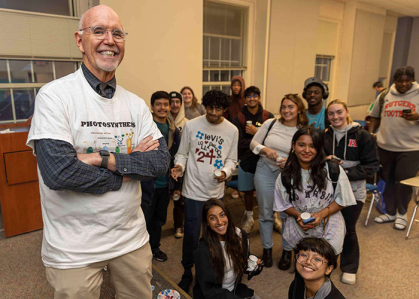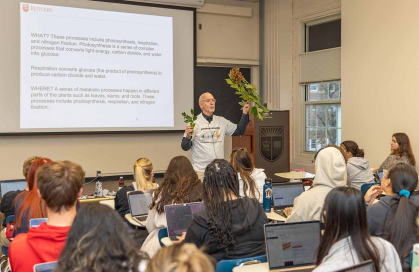In Mark Robson’s science class, hands-on learning brings students into the heart of nature
It was Cranberry Night for the students of Mark Robson’s evening science course, “Plants and People,” and the instructor wasn’t entirely happy with himself.
On this cool fall evening, the professor and administrator at Rutgers University-New Brunswick had toted in whole cranberries and a host of other cran-related goodies for his 70-plus students to sample. Robson was disappointed because plain cranberries were sold out, leaving only those of the frozen variety.
“They don’t bounce!” he said glumly.
But Robson’s frown was fleeting, quickly replaced with his signature grin.
As his students know, Robson’s classes are seriously fun. He uses plant props while lecturing, brandishing branches of swamp white oak and Douglas Fir, peppers his lessons with dad jokes and funny photos, and ends his instructions with plant tastings of cranberries, juice, chocolate or nutty treats.
The lessons from Robson, a Distinguished Professor of Plant Biology at the Rutgers School of Environmental and Biological Sciences, stay with his students, even when they aren’t science majors.
“As a student whose specialty is writing, rather than calculations and experiments, I am finding that science is much less intimidating to me now,” said Kate Beemer, a senior majoring in journalism and media studies. “Dr. Robson’s lectures are approachable and engaging, and he breaks down the facts in a way that makes sense even to someone in my field of study.”
The “Plants and People” class that Robson teaches is designed for nonscience majors such as Beemer. His goal is to get students to understand how interwoven humans and plants are – through food, oxygenated air and the Earth’s ecosystem.
But what inevitably happens, according to his students, is that he achieves something on an even broader scale: Students who used to “hate” science come to like it.

Raynor Andrews, a freshman and an offensive lineman on the Rutgers Scarlet Knights football team, said the class has given him a new appreciation for his family, who live in the Bahamas and are farmers.
“I really like coming to this class,” Andrews said. “It opened up my mind to the idea of how certain plants can help your body and be good for you. More than that, it gives me a much better sense of what my family does.”
“Plants and People” has been designed by Robson as a survey course that any student can take and understand. Because it satisfies the core curriculum goals for the natural sciences set by the School of Arts and Sciences, Robson said the course attracts many nonscience majors.
“The class introduces the student to a key idea: the central dependency of all animals – including humans – upon plants,” said Robson, who is also a Rutgers Board of Governors Distinguished Service Professor and dean of the School of Graduate Studies. “Everyone needs to learn how plants contribute to all aspects of human existence and well-being.”
Before Cranberry Night could begin, Robson covered his subject by maintaining a conversational tone without dumbing it down. Wearing a T-shirt that displayed the word “photosynthesis” in capital letters, he covered a range of topics.
Robson brought up plant physiology, offering details on how plants grow, develop, reproduce and interact with their environment. He focused on the elemental process of photosynthesis. He highlighted the crucial role of stomata, tiny pores on leaves that function as “breathing” mechanisms. He conveyed the importance of soil pH for plant growth and the essential nature of cold spells for peaches to grow properly.
“There really are no ‘dumb questions’ for Mark, which is refreshing,” said Distinguished Professor William Hallman, who has co-taught an upper-level course on toxicology and risk communication, “Risk, Health and Safety,” with Robson for the past 20 years. “He always listens, and he has a nice way of reinforcing what is in the class materials.”
Robson knows well that the subject of plants and people can be deadly serious. In his 45-year career as a Rutgers faculty member, he has emerged as an international expert on the toxic effects of agricultural chemicals on farmers and their families. He was honored at the Royal Thai Embassy last week, awarded the “Friend of Thai Science Award” for his long-term efforts in Thailand to teach and promote public health and environmental science.
There’s a time for gravity for the subject, but Robson said that, in having fun, his students will forever associate that emotion with science.

With some of the evening’s toughest intellectual challenges behind them, Robson and his students moved on to a celebration of cranberries. As Robson dispensed the classic variety of cranberry juice cocktail in white paper cups to students who crowded around him, others split off to help themselves to a wide range of alternative cranberry products Robson had carefully arranged on a platform facing the classroom.
Students sipped “tropical” cranberry juice and white cranberry-strawberry juice. They chewed on plain dried cranberries sold commercially as “craisins” as well as pomegranate- and cherry juice-infused versions. Some tried, without success, to bounce slightly thawed cranberries into their mouths.
As he snacked on cranberries, Connor Morrissey, a senior majoring in music composition at the Mason Gross School of the Arts, said Robson’s class has broadened his world view.
“I spend a large majority of my day eating, sleeping, breathing, drinking and thinking about music, and there are very few opportunities like this class where I’m able to go outside the confines of my major and explore a little bit,” he said.
During strolls on campus that Morrissey takes “to get the engine running” and germinate ideas, the student said he finds that he now thinks differently.
Morrissey’s classmate, sophomore biochemistry major Jonas Covalesky, who joined him in downing some of the tart fruit, said he is already enthused about science and the prospect of being a student at a moment in history when science is evolving in exciting ways.
“I’ve always had a passion for science,” Covalesky said. “But I’ve been focusing on human science. Through this class I’m realizing how much there is to know in plant science and how it applies to my everyday life.”
In enhancing students’ world view to encompass plant science and more, Robson is fulfilling a fundamental role, according to a long-time colleague.
“I think every student coming through universities needs to have a basic understanding of science, scientific concepts and that the scientific way of thinking is important and can apply to all aspects of their life,” said Margaret Brennan-Tonetta, senior associate director of the Rutgers New Jersey Agricultural Experiment Station/Economic Development. “Mark opens their eyes to that world and that way of thinking.”
This post was originally published on here







